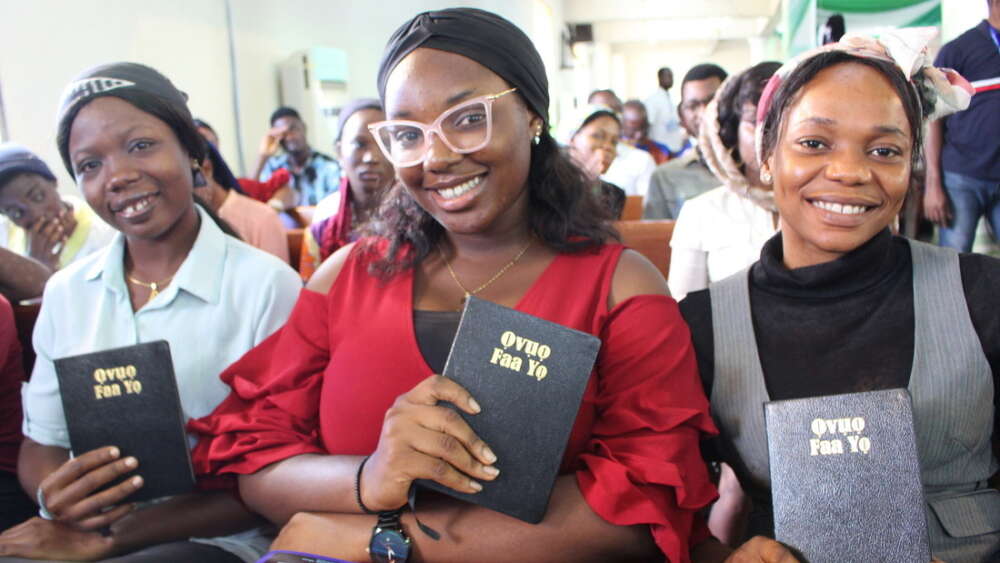Bible translation in 2020: a bright light in a dark year
66 language translations finished for use by 707 million people
2020 will forever be marked in the history books as the year of COVID-19. Yet, even in the darkness of a global pandemic, the light of Bible translation work shone brightly, as Bible Societies around the world completed Scripture translations in 66 languages used by 707 million people.
These include first Bible translations in 46 languages, with a potential reach of 13 million people. Also, six language groups received the full Bible for the first time – five in Africa and the other in the USA, where the Deaf community celebrated the completion of the American Sign Language Bible.
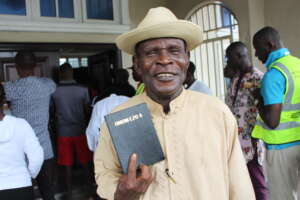
John Okolubo at Ogbia New Testament launch in Nigeria. Image: Benjamin Mordi, Bible Society of Nigeria.
First New Testaments in another 11 languages which are used by four million people were also completed. Two of these – the Epie and Ogbia New Testaments – were launched by the Bible Society of Nigeria.
“As I receive this [Epie New Testament] today, I am the happiest person,” smiled Elder Iwo Samson Famous, an Epie speaker in Nigeria. “For a long time we have been struggling with the English Bible. We can now read and understand.”
“… it was like we lacked God’s presence, but with it we have reached the promised land.” – John Okolubo.
“This New Testament in our mother tongue will aid literacy and encourage our youth and others to understand the Word of God,” said Ogbia speaker John Okolubo.
“Without it, it was like we lacked God’s presence, but with it we have reached the promised land.”
In Vanuatu – one of the few countries almost untouched by the global pandemic – translation started four decades ago, only to be disrupted numerous times by cyclones which destroyed homes, livelihoods and, on some occasions, parts of the translation work.
In the wake of Cyclone Pam in 2015, the translators even had to live in tents for months, but the translation manuscript was safe, having been secured in a plastic container just before the cyclone hit.
Finally, on October 26 2020, Hano-speakers in Angoro village in the north of Pentecost Island welcomed the long-awaited first New Testament in their language with traditional songs and dances. It was launched both digitally, via the YouVersion app, and in print.
Reaching more people with new and revised translations and Study Bibles
While translating new languages, Bible Societies across the world are also undertaking Bible revisions to ensure that younger generations can understand the Bible as language evolves. Last year, Bible Societies published new or revised translations in 21 languages used by 694 million people, including nine full Bibles.
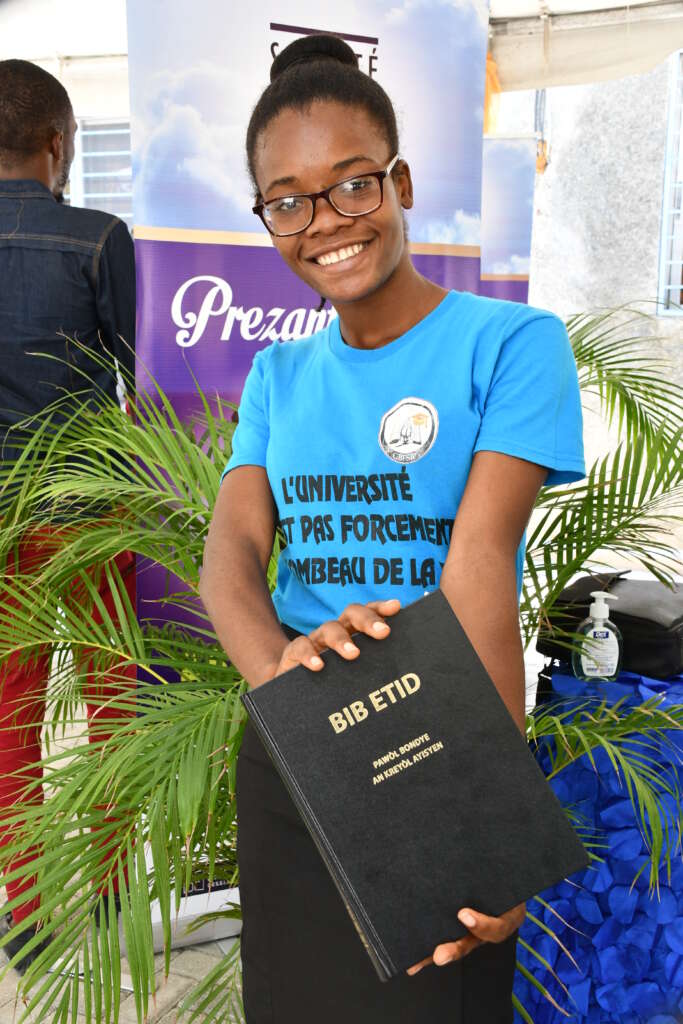
A smiling student with her copy of the very first Haitian Creole Study Bible on 28 February 2020 in Quisqueya Chapel in Port au Prince. Image: Haitian Bible Society
Among the new Bible translations published in 2020 were two of South Africa’s 11 official languages – isiZulu, spoken by 12 million people, and Afrikaans, spoken by more than seven million people. The Bible has been available in isiZulu since 1883 but the most widely-used version today was published in 1959.
“The words contained in this book, when they enter the heart, are self-evidently true across any culture and language.” – Prince Dr Mangosuthu Buthelezi
These two major publications formed part of the Bible Society of South Africa’s year-long activities to mark its 200th anniversary at a dedication service where Prince Dr Mangosuthu Buthelezi, 92, represented Zulu monarch King Goodwill Zwelithini.
“The words contained in this book, when they enter the heart, are self-evidently true across any culture and language,” Dr Buthelezi said.
Dr Buthelezi played a key role in the government of national unity led by Nelson Mandela. He said he felt blessed to have been able to read God’s Word in his own language throughout his life and thanked the Bible Society for the new translation which he believed would help more people “come to know the Scriptures and be led by faith.”
Another focus for Bible Societies across the world is helping people deepen their knowledge of the Bible. And, in 2020, Bible Societies published study editions of the Bible aimed at doing just that in three languages – Chinese, Haitian Creole and Thai.
“We Haitians are a traumatised people,” said Haitian Bible Society General Secretary Magda Victor about the new Haitian Study Bible. “We need healing and are searching for a response to all the pain we have experienced.
“That’s why there’s a church on nearly every street corner. But very often, church leaders don’t really understand the biblical text very well. We feel confident that this Study Bible will support them in their ministry.”
An important milestone in global Bible translation reached
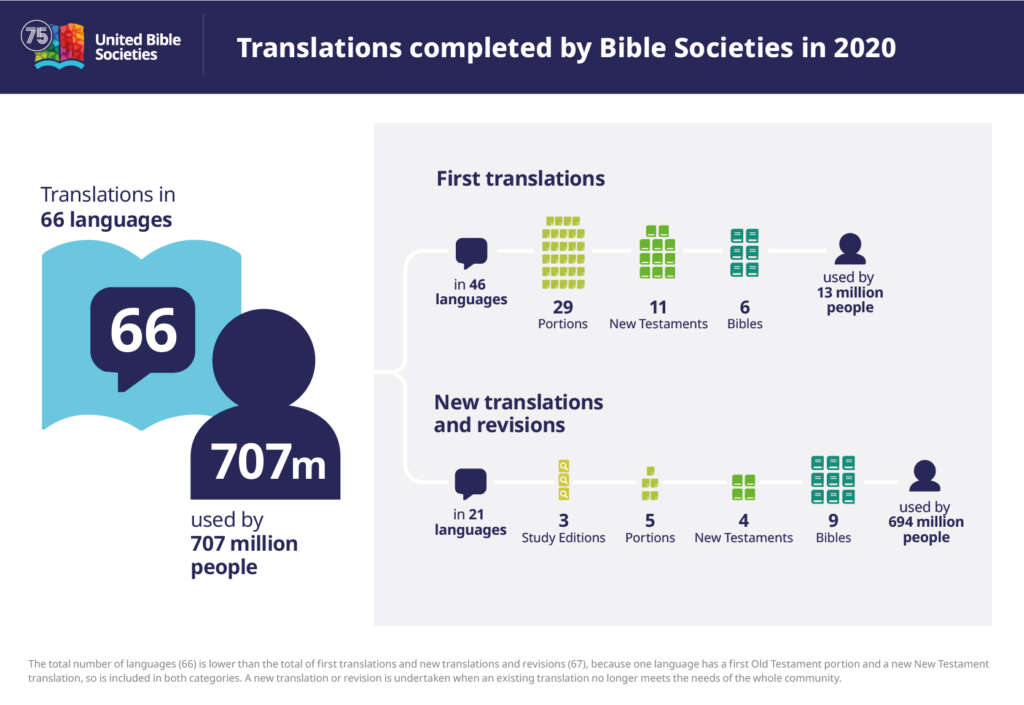
Image: Nate Fussner / United Bible Societies
The number of languages with the full Bible topped 700 for the first time in August 2020 – a significant milestone for global Bible translation work that provided a rare moment of celebration during a tough year.
Now, at the start of 2021, the full Bible is available in 704 languages used by 5.7 billion people. Another 825 million people have the New Testament in their language, and 450 million people have some portions of Scripture.
This is a vastly different situation to the Bible translation landscape of 75 years ago, when United Bible Societies was first formed in the wake of World War II (in 1946).
Then, according to ProgressBible – which compiles data from Bible translation agencies across the world – fewer than 200 languages had the full Bible.
1.5 billion people still do not have the full Bible in their language
In fact, just over 230 languages had the New Testament, with 620 having some portions of Scripture.
Since then, the number of languages with some Scripture has more than tripled. Yet despite the great progress, more than half of the world’s 7,359 languages still have no Scripture at all today. And, 1.5 billion people still do not have the full Bible in their language.
“As we look back at more than two centuries of Bible Society work and 75 years of working together as United Bible Societies, we give thanks to God for blessing our common mission of making the Bible available to everyone,” says UBS Director General Michael Perreau.
“Each completed Scripture translation makes it possible for more people to access the hope and peace in God’s Word, which is especially needed at this time of global turmoil.
“Yet more than a billion people still do not have the Bible in their own language. They are without the comfort of Scripture as they navigate the storms of life. That is why the task of Bible translation is so urgent,” he said.
The ambitious vision of the Bible Translation Roadmap
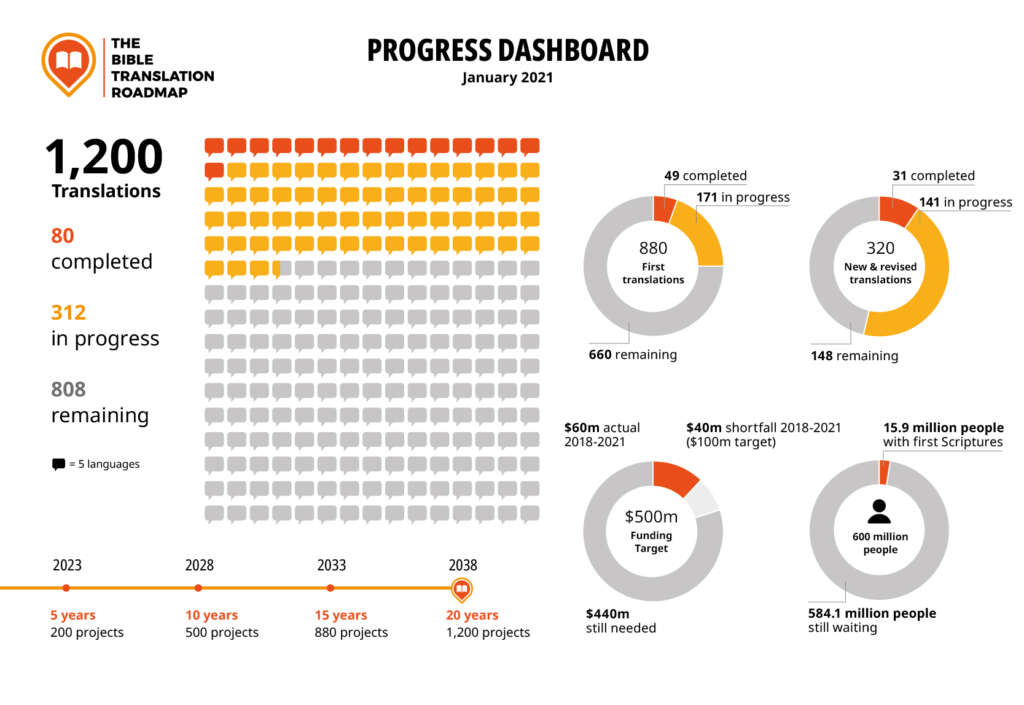
Image: Nate Fussner / United Bible Societies
Consequently, Bible Societies across the world are continuing to push forward with the Bible Translation Roadmap – a 20-year vision to complete 1,200 translations to make the Bible available in the languages of 600 million people for the first time.
The Roadmap was established three years ago. It a framework aimed at increasing momentum in Bible translation by bringing Bible translation agencies together to collaborate, harnessing the generous support of donors, and making the most of developments in technology.
Since the Roadmap’s creation, 80 translations have been completed, 312 are in progress, and another 808 are yet to begin.
One significant obstacle to achieving the vision laid out in the Roadmap is securing funding. Around $30 million is needed each year to achieve set goals but less than half of that funding has been made available so far.
“Translating the Bible takes years of dedication and generosity, and is the first step in a community getting life-changing access to God’s Word,” says UBS Executive Director of Global Bible Translation Alexander M. Schweitzer.
“The availability of mother tongue Scripture makes it possible to develop Bible ministry programs to meet the needs of the community, such as literacy or trauma healing. Bible translation transforms lives – that’s why we are committed to fulfilling the ambitious vision of the roadmap.”
United Bible Societies is a fellowship of around 150 Bible Societies working in 240 countries and territories, including Australia. Together, they are the world’s biggest translator, publisher and distributor of the Bible. Bible Societies are also active in areas such as HIV/AIDS prevention, trauma healing and literacy. Bible Societies work with all Christian Churches and many international non-governmental organisations. For more information visit http://www.unitedbiblesocieties.org/
Learn more about the work Bible Society Australia is undertaking in Indigenous Bible Translations and Auslan.
Make a Donation
Support Bible translation work around the world through Bible Society Australia.
